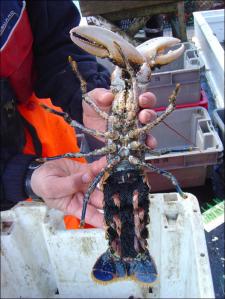Efforts to maintain and protect lobster stocks
The Northumberland inshore fisheries are dominated by a pot fishery targeting lobsters. The local management reflects the focus on this fishery by limiting pot numbers to 800 per boat in the inshore area and restricting which bait a fisherman can use. Such management measures are likely to have benefited the fishery with recent landings of lobster at an unprecedented high. The Northumberland IFCA take the management of the lobster fishery further by buying berried hens back from local shellfish merchants for release back into inshore waters. Berried hens are female lobsters which carry the unhatched eggs under their tail.
 By marking these lobsters with a notch in the tail, the female lobster is then protected from fishing effort until the notch has grown out – a likely timescale of two years. This will allow the female lobsters to release their eggs in their natural environment and further strengthen the inshore lobster stock. What was pleasing to see is that most fishermen recognise that this management is beneficial to the long term sustainability of the fishery, with some voluntarily contributing to the purchase of the lobsters. Others take the opportunity to mark (notch) their own lobsters before releasing them which can protect what is known as the brood stock – the lobsters which are sexually mature and capable of sustaining the local population.
By marking these lobsters with a notch in the tail, the female lobster is then protected from fishing effort until the notch has grown out – a likely timescale of two years. This will allow the female lobsters to release their eggs in their natural environment and further strengthen the inshore lobster stock. What was pleasing to see is that most fishermen recognise that this management is beneficial to the long term sustainability of the fishery, with some voluntarily contributing to the purchase of the lobsters. Others take the opportunity to mark (notch) their own lobsters before releasing them which can protect what is known as the brood stock – the lobsters which are sexually mature and capable of sustaining the local population.Project Inshore
As well as hearing how the local fishermen feel about the state of their fishery, it was important for me to explain how Project Inshore works and may affect them as inshore fishermen. As the project team continue to work on the Stage Two MSC pre-assessment/gap analysis stage it was important to explain that the fishery would be reviewed on three levels:
Having described the pre-assessment process to fishermen and how this will feed into the Stage Three sustainability review with its intent in guiding inshore management, the current state of the domestic markets was discussed. With the Project Inshore team engaging with key retailers and wholesalers who may look to source locally caught where possible, there is the potential opportunity to strengthen the domestic market, feeding into their sourcing strategies and allowing further opportunities to switch species where appropriate. As picked up on in documentaries such as The Fishermen’s Apprentice with Monty Halls, a lot of English seafood is exported to European markets where the demand for high quality English shellfish is insatiable. Project Inshore is looking to strengthen the sustainability credentials of the inshore fisheries and provide IFCAs with a further tool in their toolbox for management and research. This can help provide some retailers and wholesalers who adhere to a very strong sourcing policy being able to look at inshore fisheries in a new light.
The Stage Two reports highlighting the pre-assessment findings will be available in May 2013 on the Project Inshore website. This will be followed by the Stage Three Sustainability Reviews in January 2014. The intent of the Sustainability Reviews will be to highlight best practice in inshore management and offer IFCAs a roadmap for future management and research bringing inshore fisheries up to a level deemed sustainable to the MSC’s Standard.
More information
Project InshoreNorthumberland IFCA


